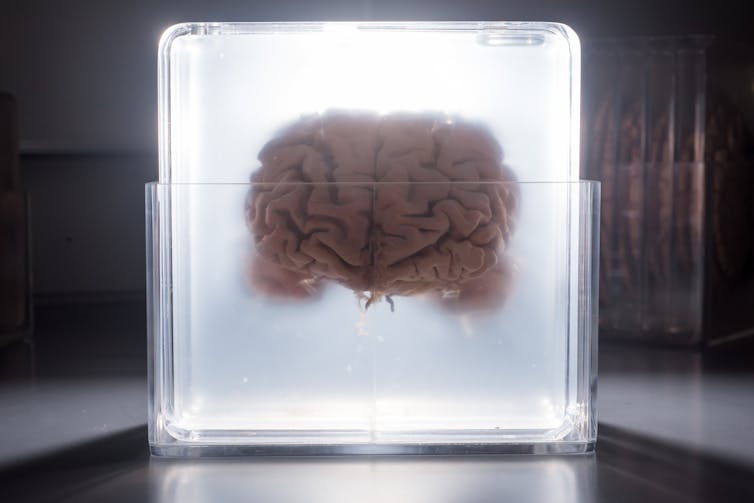Uploading Mind on to Computer Creating a World
People have always dreamed about going beyond the limitations of their bodies: the pain, illness and, in a higher place all, expiry. Now a new motility is dressing upwardly this ancient bulldoze in new technological wearing apparel. Referred to equally transhumanism, it is the belief that science volition provide a futuristic mode for humans to evolve beyond their current physical forms and realise these dreams of transcendence.
Perhaps the well-nigh dramatic way transhumanists believe that applied science will transform the man condition is the idea that someone'due south mind could be converted into digital data and "uploaded" into an immensely powerful calculator. This would permit you to alive in a world of unbounded virtual experiences and effectively achieve immortality (every bit long as someone remembers to do the backups and doesn't switch you lot off).
Yet transhumanists seem to ignore the fact that this kind of mind-uploading has some insurmountable obstacles. The practical difficulties mean information technology couldn't happen in the foreseeable future, but there are also some more fundamental problems with the whole concept.
The thought of encephalon uploading is a staple of science fiction. The writer and managing director of engineering at Google, Ray Kurzweil, has perchance done the well-nigh to popularise the idea that it might become reality – perhaps as shortly as 2045. Recently, the economist Robin Hanson has explored in detail the consequences of such a scenario for society and the economy. He imagines a world in which all piece of work is carried out by disembodied emulations of human being minds, running in simulations of virtual reality using urban center-size cloud calculating facilities.
It's a brusque stride from the idea that our minds could exist uploaded, to the notion that they already have been and that we are already living in a Matrix-manner computer simulation. Engineering science entrepreneur Elon Musk recently revived this discussion by arguing the hazard that we are not living in a computer simulation was merely "one in billions". Of grade, this is just a technological revival of the thought that reality is an illusion, which has been discussed by philosophers and mystics for hundreds of years.
Simply there are some serious problems with the idea that we could upload our minds to a estimator. To start with, the practical issue: our brains each have trillions of connections between 86 billion or so neurons. To replicate the mind digitally we would have to map each of these connections, something that is far beyond our current capabilities. With the current speed of development of computers and imaging technologies, we might exist able to practice this in a few decades but only for a dead and sectioned brain.
More than molecules
Yet even if we could create such a "wiring diagram" for a living brain, that wouldn't be enough to sympathize how it operates. For that we'd need to quantify exactly how the neurons interact at each of the junctions, and that's a matter of molecular-level particular. We don't even know how many molecules are in the brain, let lonely how many are vital for its functions, but whatsoever the respond information technology's too many to replicate with a computer.
This points us towards a deeper conceptual difficulty. Simply because we can simulate some aspects of the way the encephalon works, that doesn't necessarily hateful nosotros are completely emulating a real brain, or indeed a heed. No conceivable increase in computer power will allow u.s. to simulate the brain at the level of individual molecules. So brain emulation would merely be possible if we could abstract its digital, logical operations from the messy molecular level detail.

To understand the operations of a man-made estimator, we don't demand to keep track of the currents and voltages in every component, much less understand what every electron is doing. We've designed the switching operations of the transistors so in that location's an unambiguous mapping from the state of the circuits to the simple digital logic of ones and zeros. But no-ane designed a brain – it evolved – so there is no reason to look any simple mapping of its operations to digital logic.
Unsafe thought
Even if heed uploading is an impossible dream, some might debate that it does no damage to imagine such possibilities. Everyone at some signal must fearfulness their ain mortality, and who am I to debate with the many different ways people take of dealing with those fears?
Only transhumanism'south mixing of substantially religious ideas with scientific language matters because it distorts the way we recall nigh engineering. Transhumanism tends to see technology every bit a style to grant all our wishes. And this is often justified by the argument that technology volition inevitably drive human development in a positive direction.
Yet this distorts our scientific priorities and gets in the mode of us making sensible choices nigh developing the technologies we need to solve our very real electric current problems. Brain uploading is a great premise for speculative fiction, merely information technology's not a skillful basis for talking nigh the futurity.
Source: https://theconversation.com/could-we-upload-a-brain-to-a-computer-and-should-we-even-try-61928
0 Response to "Uploading Mind on to Computer Creating a World"
Enregistrer un commentaire